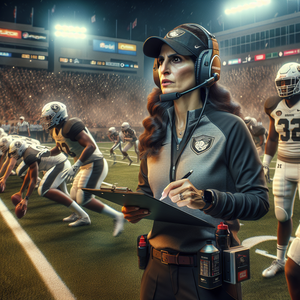
Navigating the Elite Coaching Landscape in College Football: A Comprehensive Guide to Premier Positions
The realm of college football coaching is a vibrant and competitive arena, ripe with opportunities for those eager to leave their mark. Top-tier positions at esteemed institutions such as Alabama, Georgia, and Ohio State are not just symbols of prestige; they come with specific responsibilities, expectations, and pathways for career growth. The subjective nature of what defines "elite" coaching roles is shaped by various elements, including program history, recruitment strategies, facilities, and institutional backing. For aspiring coaches, understanding the diverse coaching roles—from head coaches to specialized analysts—provides a clear roadmap to success. In this article, we explore the most revered coaching positions in college football, outlining their requirements, contributions, and unique attributes that elevate them to premier status.
Job Summaries:
Head Football Coach:
- The head coach is the architect of the football program.
- Overseeing game strategies, staff management, player recruitment, and ensuring academic compliance.
- This role demands extensive experience and a deep understanding of football.
- Typically requires a bachelor’s degree in a related field.
- Successful head coaches create a winning culture.
- Engage actively with the community and alumni.
- This position is marked as the pinnacle of coaching roles.
Offensive Coordinator:
- The offensive coordinator is the mastermind behind the offensive game plan.
- They craft plays aimed at maximizing scoring opportunities.
- Candidates for this role should possess a robust knowledge of offensive tactics.
- Play-calling experience and analytical skills are essential.
- A degree in sports management and prior coaching experience is often required.
- Their impact on a team’s performance and player development can be substantial.
Defensive Coordinator:
- The defensive coordinator develops strategies to counter opposing offenses.
- Requires advanced knowledge of defensive analysis and scheme development.
- A bachelor’s degree in sports management and considerable coaching experience are usually prerequisites.
- This role is crucial for building championship-caliber defenses that enhance a team's competitive edge.
Quarterbacks Coach:
- Focusing on quarterback performance
- Conducts training sessions
- Collaborates with the offensive coordinator
- Candidates often have a playing or coaching background at the quarterback position
- Candidates often have a degree in sports science
- This role is vital for cultivating leadership skills within the offense.
Recruiting Coordinator:
- The recruiting coordinator oversees the recruitment process.
- Identifying and evaluating potential student-athletes.
- Strong communication skills are essential.
- Knowledge of NCAA regulations is necessary.
- Scouting experience is important.
- A bachelor’s degree in sports management is typically required.
- This role is pivotal for maintaining a talent pipeline.
- The talent pipeline fuels the program’s competitive success.
Strength and Conditioning Coach:
- Responsible for player fitness and injury prevention.
- Develops training programs tailored to the team’s needs.
- Candidates usually hold degrees in exercise science and relevant certifications.
- This position is essential for preparing players for the rigors of college football.
Special Teams Coordinator:
- The special teams coordinator manages all facets of special teams play.
- Requires a deep understanding of game situations and player development.
- A bachelor’s degree in sports management is often necessary.
- Previous coaching experience is often necessary.
- This role can be the deciding factor in tightly contested games.
Football Analyst:
- The football analyst utilizes data analysis and strategic recommendations to enhance team performance.
- Strong analytical skills and familiarity with video editing software are crucial.
- With the growing importance of data analytics in coaching, this position is increasingly vital for shaping game strategies and player assessments.
Defensive Backs Coach:
- Specializing in developing defensive backs
- This coach focuses on tackling and coverage techniques
- Candidates typically come from defensive backgrounds
- Candidates hold a degree in sports management
- Their role is critical in ensuring defensive backs execute the team’s strategies effectively
Linebackers Coach:
- This coach trains linebackers in techniques and understanding defensive schemes.
- Candidates generally have coaching experience and a background in playing linebacker, along with a degree in sports science.
- Their contributions are essential for a cohesive defensive strategy.
Wide Receivers Coach:
- Dedicated to improving the skills of wide receivers
- Emphasizes route running and game preparation
- Candidates usually have relevant coaching or playing experience
- Candidates usually have a degree in sports management
- This position is integral to the team’s offensive achievements
Football Operations Director:
- The operations director manages logistical and administrative tasks, such as travel arrangements and NCAA compliance.
- Strong organizational skills and a degree in sports management are typically required.
- This role allows coaching staff to focus on strategy and training.
Athletic Trainer:
- The athletic trainer ensures player health by providing injury prevention and rehabilitation services.
- Candidates usually hold degrees in athletic training and relevant licensure.
- Their role is crucial for maintaining player fitness throughout the season.
Director of Player Personnel:
- Oversees the recruitment and evaluation of prospective athletes.
- Strong networking skills and knowledge of NCAA rules are essential.
- A degree in sports management or a related field is typically required.
- Fundamental in attracting high-caliber talent to the program.
Football Compliance Officer:
- Ensuring NCAA compliance
- The compliance officer monitors recruiting practices
- Monitors student-athlete eligibility
- Candidates typically hold a law degree or a degree focused on sports compliance
- This role is key to upholding the program's integrity
Game Day Operations Coordinator:
- Manages all logistical elements of home games
- Includes facility setup and crowd management
- Candidates usually have strong organizational skills
- Event management experience is preferred
- Efforts are crucial for ensuring a positive experience for fans and players alike
Football Video Coordinator:
- Responsible for capturing and analyzing game footage
- Provides essential tools for coaches
- Candidates typically have experience with video editing
- Candidates typically have a background in sports media
- Enhances strategic planning through detailed analysis
Youth Football Development Coordinator:
- This coordinator fosters relationships with local schools to promote college football and scout future talent.
- Candidates often have coaching experience and a degree in sports management.
- This position is key for building community ties and a talent pipeline.
Football Academic Advisor:
- The academic advisor assists student-athletes in balancing academics and athletics.
- Monitoring progress and offering tutoring resources.
- Candidates typically hold degrees in education or counseling.
- This role is vital for ensuring academic success and eligibility.
Football Marketing Director:
- The marketing director devises strategies to promote the football program and boost fan engagement.
- Strong communication skills and a degree in marketing are usually required.
- This position is essential for cultivating a strong program brand and community support.
The diverse roles within college football coaching reflect the intricate workings of a successful program. Each position plays a significant part in athlete development, community engagement, and competitive success. For those interested in pursuing a career in this dynamic field, exploring current openings in these roles can lead to fulfilling opportunities aligned with their passion for the sport. By understanding the expectations and pathways associated with each position, aspiring coaches and staff can better position themselves for success in the competitive world of college football.
Explore More Jobs

